The mouth is a mirror of the overall health, reiterating the fact that oral health is integral to the general health of every human being. Currently the elderly population in India is around 153 million (aged 60 and above) and is expected to reach a staggering 347 million by 2050. Studies show that older persons are particularly affected by poor oral health, which in turn has negative consequences on their general health.
Need for a Healthy Dentition in Ageing Adults
There is an overwhelming body of evidence that suggests the need to maintain a healthy natural dentition in old age from a structural, functional and psycho-social point of view. The number of teeth is a predictor of mortality, increased longevity is believed to be dependent on the increased number of teeth.
Tooth loss impairs the chewing performance, hence an unconscious change in food intake occurs that leads to withdrawal from common meals, resulting in malnutrition. It is also believed that the very act of mastication increases the blood flow to the brain, activating the brain cortex which is beneficial for cognitive function.
Natural teeth can optionally support crowns, fixed bridges, overdentures and removable dentures. Retaining and restoring damaged teeth is important to maintain the vertical dimension which is important for the temporomandibular function and health.
Poor oral appearance and bad breath may impede social interaction. Hence, preserving the teeth in a healthy condition brings about a sense of well-being and happiness.
General Health and Oral Health are closely linked
Oral health can be compromised by a number of systemic chronic and infectious diseases that have oral symptoms. On the other hand, oral diseases can lead to infection, inflammation and other serious impacts on overall health.
Connections between poor oral health and major non-communicable diseases like diabetes, cardiovascular diseases and respiratory diseases are undisputed. A simple example of diabetes, the relationship between diabetes and gum health is bidirectional. Hyperglycemia can lead to gum disease, while gum disease like periodontitis affect glycemic control.
People with poor gum health are more prone to serious cardiovascular events and respiratory issues. 10% of nursing home deaths from aspiration pneumonia can be avoided by improving the oral hygiene. Diseases like rheumatoid arthritis make routine oral practice difficult. Neurodegenerative diseases like dementia, Alzheimer’s, Parkinsonism affect the oral health. Depression in older adults can result in neglect of oral health which subsequently increases the risk of caries and gum disease.
Taking multiple medications (polypharmacy) for non-communicable diseases has adverse effects on the oral health, Xerostomia (dry mouth) is the most common problem.
Along with physiological changes of ageing, physical changes involve reduced bone and muscle mass. Mobility can be reduced in osteoarthritis making it difficult to step out to seek oral health care. A variety of visual changes such as cataracts, macular degeneration; audio changes such as hearing loss can make communication, patient education and oral healthcare increasingly difficult.
Age Related Oral Changes
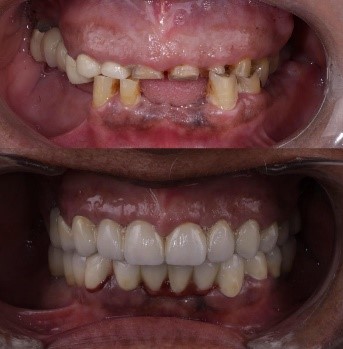
ATTRITION, PARTIAL EDENTULISM AND LOSS OF FACIAL HEIGHT, TREATED WITH ROOT CANAL THERAPY, CROWNS AND IMPLANTS
The common age-related changes that occur in the teeth are wasting diseases like attrition, abrasion, erosion and abfraction whereby the outer enamel wears away making the teeth sensitive and vulnerable to decay in the oral environment.
The tooth supporting structures, gingiva (gums) can recede, with loss of supporting bone, tooth mobility and eventually tooth loss.
The gaps between the teeth become potential sites for food impaction that can lead to cavities either on the proximal surfaces or on the root surfaces. Tooth loss is the end point of severe dental decay and gum disease and this can lead to complete teeth loss of the entire dentition.
Saliva plays an important role in chewing, lubrication of food, swallowing and speech. Salivary glands can undergo degenerative changes thus reducing the salivary output. Long-term medications such as antidepressants, anti-hypertensives, and antihistamines are commonly associated with dry mouth, which in turn causes difficulty in food swallowing (dysphagia), cracked lips, fissured tongue, mucositis, and cavities.
The oral mucosa is the lining of the oral cavity which becomes thinner and non-resilient with age. This can predispose patients to cancer and pre-cancerous lesions, which can be seriously life threatening.
Taste buds on the tongue decrease and begin to shrink with age, altering the sense of taste and gets compounded in a dry mouth.
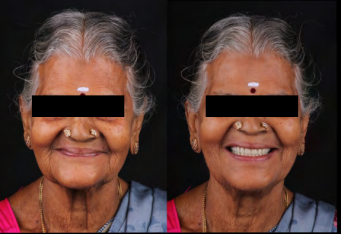
TOTAL EDENTULISM TREATED WITH COMPLETE DENTURE
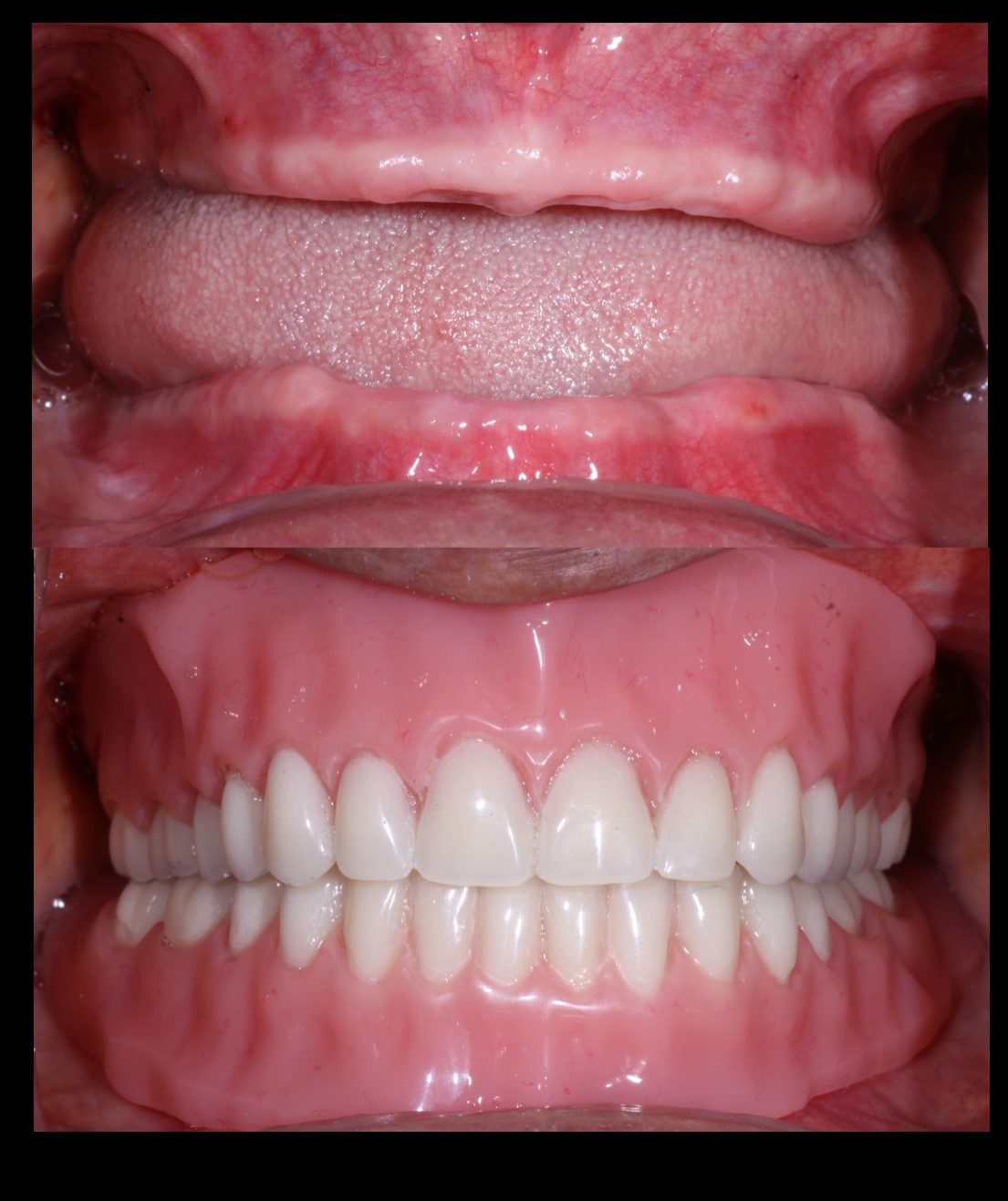
Common Dental Problems
1 Dental caries (Cavities)
2 Periodontitis (Gum Disease)
3 Wear in teeth – (Attrition, Abrasion, Erosion, Abfraction)
4 Xerostomia (Dry Mouth)
5 Edentulism ( Tooth Loss)
6 Oral Cancer
1 Dental Caries (tooth decay) is one of the most common bacterial diseases in man that causes the loss of tooth structure, potential pain, and untimely loss of teeth, leading to impaired appearance and function.
In the ageing adult, the blunt chewing surfaces of the teeth with flattened contacts with adjacent teeth result in stagnation of food, making the surfaces prone to decay.
With gum recession, the root surfaces are exposed to the oral cavity, making it vulnerable to decay in absence of good oral hygiene.
A reduced salivary output, lack of good oral care, a diet high in carbohydrates and sugar leads to rapid cavitation of the tooth surface.
2 Periodontitis (gum disease) is seen in over 60% of the older adults. There is a loss of attachment of the gingiva (gum) against the supporting tooth structure due to the presence of plaque (soft tenacious deposits around the teeth), lack of proper oral hygiene measures, reduced manual dexterity, and multiple comorbidities. The gums tend to bleed while brushing , bad breath can ensue and can progressively lead to looseness of the teeth.
3 Tooth Wear is commonly found in the ageing adult due to mechanical forces of tooth to tooth contact (attrition); pathological wear due to extrinsic mechanical forces resulting in a notch or depression around the neck of the teeth (abrasion); chemical dissolution (erosion) , abnormal forces in tooth to tooth contact causing wedged shaped notches around the necks of the teeth (abfraction). These result in hypersensitivity, sharp teeth edges that abrade the tongue/mucosa, reduced height of the teeth and the teeth in turn lowers face height. Reduction in the face height due to attrition can lead to temporomandibular joint dysfunction.
4 Xerostomia (Dry Mouth) It affects 30% of the patients above the age of 65 years. There is an increased risk of dental caries, gum disease, difficulty speaking and swallowing, burning mouth syndrome, taste alterations and denture related soreness, ulcers, and fungal infection
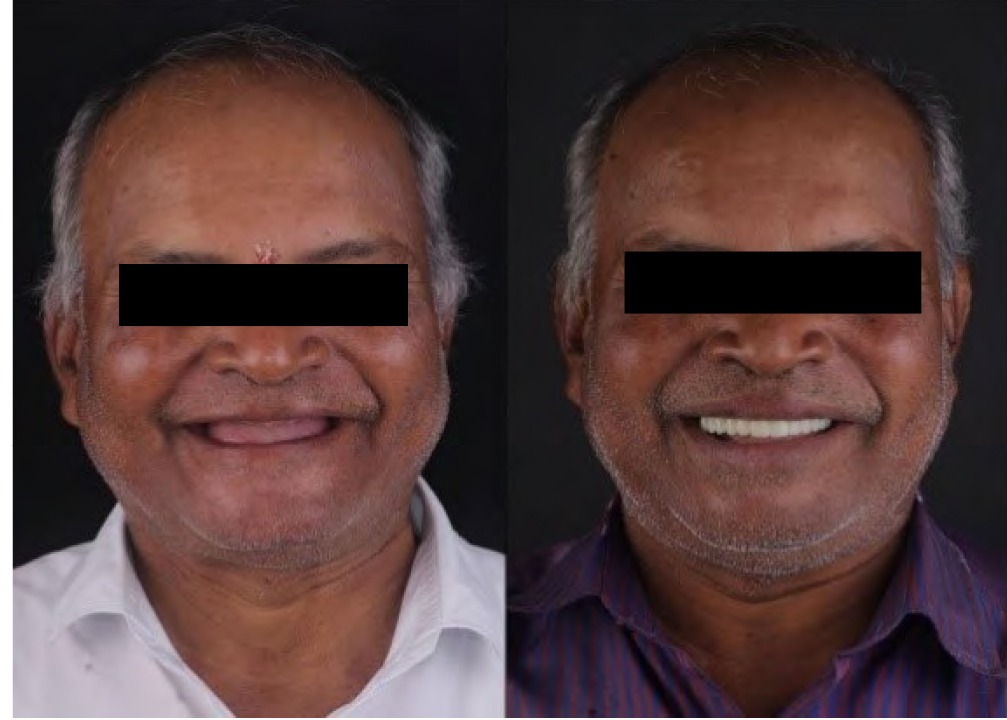
5 Edentulism (Tooth loss) This affects the nutritional intake and poses the risk of malnutrition and negatively impacts the self-esteem and oral-health related quality of life. Older adults with multiple missing teeth have a 55% higher risk of having dementia.
6 Oral Precancerous and Cancerous Lesions
The outer epithelium of the mucosa becomes thinner and permeable to toxic substances and less disease resistant, thus there is an increase of precancerous and cancerous lesions. Smoking, tobacco and alcohol consumption and lack of good oral hygiene increases the risk of cancer.
Importance of Dental Care
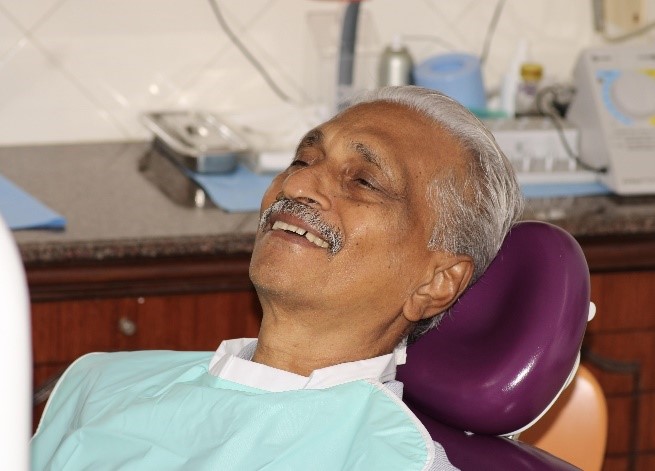
AN ORAL HEALTHY AGEING ADULT
Periodic visits to the dentist is of paramount importance. Oral disease is inevitable, but disease does not inevitably mean poor quality of life. The focus of the dentist in the ageing adult is to improve the oral health quality of life against a declining oral and general health, keeping in focus the patient, rather than the disease.
Management of chronic infection through extraction, root canal therapy and gum treatment is essential. Dental caries and tooth wear can be successfully treated through restorations.
In case of partial or complete edentulism, placement of implants and complete/partial dentures improve the function. Regular oral hygiene maintenance through scaling (clean ups) helps in improving the gum health.
In case of dry mouth, salivary substitutes and oral mucosal moisturisers are prescribed. A detailed counselling can be obtained regarding the management of a dry mouth. Oral cancer is successfully treated through surgery, chemotherapy and radiation to improve the quality of life.
Adopting preventive treatment and oral hygiene measures with regular brushing, use of fluoridated toothpastes, mouthwash, interdental aids (floss, proxa brushes, and water flosser) are beneficial.
Maintaining a balanced diet with necessary minerals and nutrients, and keeping yourself hydrated with regular sips of water improves physical health dramatically.
An ageing population is one of the most important aspects of the 21st century worldwide. Age changes in the oral cavity are inevitable, but preserving the ageing dentition against a declining general health through interceptive and preventive strategies have lifetime benefits. If ageing is inevitable, let’s be graceful and serene about it and lead a disciplined quality life.








